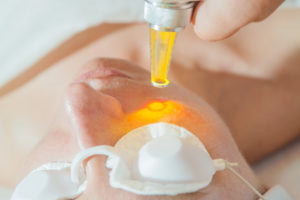 Acne typically begins in puberty, but continues affect up to 85% of people between their 20s and 50s. Acne is natural and happens when hair follicles on the face or other parts of the body become clogged with oils and dead skin cells. Unfortunately, when acne is picked at it can leave scars on the skin even after using acne medication.
Acne typically begins in puberty, but continues affect up to 85% of people between their 20s and 50s. Acne is natural and happens when hair follicles on the face or other parts of the body become clogged with oils and dead skin cells. Unfortunately, when acne is picked at it can leave scars on the skin even after using acne medication.
If your acne scars are moderate to severe, they can be treated using a Carbon Dioxide Laser system. Also known as a CO2 Laser for acne scars, these lasers are able to penetrate the skin to repair the damaged tissue and leave you with flawless looking skin.
CO2 Laser For Acne Scars: How It Works
A CO2 laser for acne scars utilizes a gas mixture that contains approximately 20% of carbon dioxide to generate a laser beam high up on the spectrum of infrared energy. The energy produced by the laser is absorbed in water.
Because the body’s cells are made up of mostly water, the damaged skin cells of your acne scars are easily diminished by the laser. Once the laser destroys the scar tissue, new tissue is able to regrow in its place.
How will my skin respond to the treatment?
Those with moderate to severe acne scarring will respond best to CO2 Laser treatment, especially if the places with the heaviest scarring is around the middle of the cheeks or around the temple area. This is because these facial areas respond less favorably to the CO2 Laser skin resurfacing.
CO2 Laser treatment is one of the most popular acne medical treatment available because the treatment can be delivered to the entire area. The treatment may also be applied to the tissue around the scar to help diminish the appearance of the acne scarring to blend the scar more naturally into the skin.
How long does a typical CO2 Laser treatment last?
Depending on the severity of the acne scarring and the position of the scarring on the skin, the treatment can take anywhere between two and six sessions. The procedure typically involves the use of anesthetics.
CO2 Laser treatment should only be administered to patients by a trained medical professional in a clinical setting specialized for the laser treatment. If used improperly by a non-medical professional, this procedure may cause permanent skin damage.
